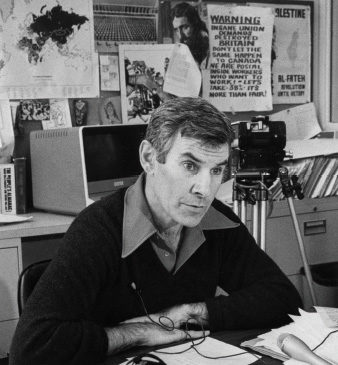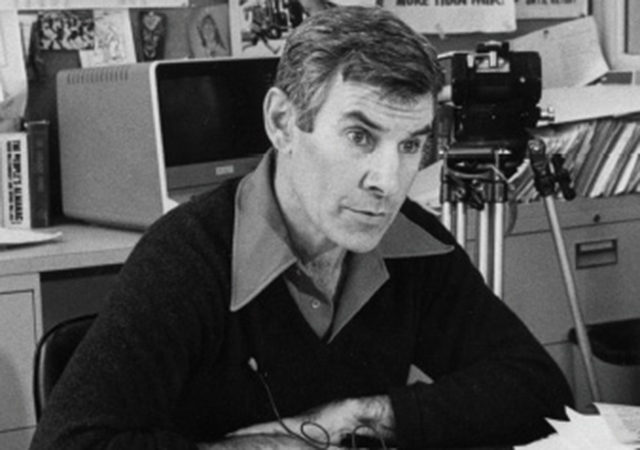
By Luc Rinaldi & Abigale Subdhan
In May 1976, three Mounties walked into Peter Worthington’s glass-walled Toronto Sun office with a search warrant. They wanted a leaked RCMP letter that contained information about Canadians charged with espionage and treason, which the Sun editor had recently mentioned in a column. He refused to hand it over. When they pleaded for a hint, Worthington replied, “Sorry, fellas, you’re on your own on this one.”
Over the next five hours, camera crews and Sun reporters—some sporting pre-emptive “Free Peter Worthington” T-shirts—watched as the Mounties searched the boss’s office. After looking through piles of books and filing cabinets, behind pictures and under rugs, the officers found the letter—in the top drawer of the desk.
Worthington’s refusal to co-operate shouldn’t have come as a surprise. The hard-nosed Sun co-founder, who died last May of a staph infection, was a staunch advocate for free expression, which showed in his gutsy, conservative journalism. Over roughly four decades as a columnist, he was fiercely opinionated and unfailingly controversial. “There was no grey. There was no mush,” says Rob Granatstein, a former Sun reporter and editor. “There was Peter telling you what he thought. Period.”
Unlike many of the columnists who came after him, whose branding depends on sensationalistic, knee-jerk panache, Worthington backed his views with hard facts and the experience he’d gained travelling the world, first as a soldier and then, for 15 years, as a foreign correspondent for the now-defunct Toronto Telegram. He brought knowledge—colleagues considered him the pre-Internet Wikipedia—where many of today’s right-wing op-ed writers offer reflexive anger; he earned a loyal following for his intelligent analysis, while contemporary pundits lure readers with outrageous claims that ignite the Twitterverse. Although he certainly inspired many of today’s Canadian conservative columnists, they’ve yet to live up to the standard he set.
***
Peter John Vickers Worthington was born in 1927, at Fort Osborne Barracks in Winnipeg. The son of a polished Quaker mother, and a father who was a major-general in Princess Patricia’s Canadian Light Infantry, he had a nomadic childhood, roving between different army camps. Early on, he took to mischief—the morning after a New Year’s Eve party, a four-year-old Worthington drained leftover bottles before wandering into the canteen and defiantly chugging a glass of beer—and to opinion. “[My father] tried to instil in us a feeling of independence and self-sufficiency,” he wrote in his 1984 memoir, Looking for Trouble, “and both my sister and I were encouraged to have opinions about whatever was being discussed at the table.”
Worthington followed in his father’s military footsteps. Rejected by the merchant navy at 15, he became the Royal Canadian Navy’s youngest sub-lieutenant three years later. He fought in the Korean War, interrupting an arts degree at the University of British Columbia that he would complete eight years after enrolling.
He then went on to study journalism at Carleton College, which later became Carleton University, on veteran credits. “The part of him that loved reporting was the same part of him that loved being a soldier,” says Worthington’s stepdaughter, Huffington Post contributing editor Danielle Crittenden. “It allowed him to go out and see not just areas of combat, but world situations that fascinated him. And he could be there on the spot to witness it.”
Worthington soon became a night reporter at the Telegram, a feisty afternoon broadsheet, where he earned $60 a week. Though he thought his military background would make him well-suited to international reporting, his editors refused his requests to cover the 1956 Suez Crisis. So he paid his own way and filed stories for the Tely free of charge, which led to a post as a foreign correspondent.
In his first years reporting abroad, Worthington began his trips by writing features, detailing interactions with locals and brushes with authorities, while learning the area’s politics and culture. He took risks (like venturing into a notoriously dangerous casbah in northern Africa), offered personal observations (writing “I saw” or “I was at the scene when”) and made stories relevant to Canadian audiences. An extreme example: while covering the Algerian War of Independence in 1962, he wrote, “If Toronto was Algiers—what would life be like? . . . At noon a car cruises slowly along Bloor Street between Yonge and Spadina, machine-gunning people as it goes. Six people lie dead on the sidewalk in a space of 10 minutes.”
As a foreign correspondent, he covered everything from the Dalai Lama’s escape from Tibet to riots in Belgium, from the Vietnam War to kidnappings in Zambia. He was the only Canadian journalist to witness the shooting of Lee Harvey Oswald, John F. Kennedy’s assassin, on November 24, 1963. (“Oswald . . . suddenly came through the doors,” he wrote in the next day’s Tely. “He looked into my eyes briefly but intently. He was white-faced, tight-lipped and held his head high and defiantly.”) Andy Donato, a Sun cartoonist and Worthington’s friend of 50 years, says, “I can’t name a country in the world that he hadn’t visited at some point.”
***
When the Tely folded in 1971, Worthington co-founded the Sun with general manager Don Hunt and publisher Doug Creighton. As editor, Worthington could usually be found chatting with Donato, gossiping with the women operating the switchboard (“They worshipped him,” says Crittenden) or, most likely, sitting at his desk writing. He could churn out a column in 20 minutes, filing seven a week—12 if you really needed them—according to Granatstein, who adds, “He drew on his experiences, and nobody had the experiences Peter Worthington had.”
Whatever the topic, the columns had a common thread. “Peter was always a defender of conservatism,” says Sun columnist Joe Warmington. “He was a defender of the unpopular.” He trod familiar right-wing ground—standing up for the likes of Margaret Thatcher and Don Cherry, criticizing the CBC and Jack Layton—with uncommon critical intellect. When questioning the true value of arts grants in a May 1977 Sun column, he referenced their 14th-century origins and failed Soviet counterparts, and was more concerned with creating better art than saving taxpayers money: “As a national make-work scheme for needy artists, Canada Council may be an answer. But it doesn’t—almost can’t, by the very nature of its being—contribute to excellence in ‘art.’” Lamenting the United Nations’s hypocrisy and inefficiency, he offered globe-spanning examples of slavery left unchecked to back his protests. On abortion legalization in 1988 (surefire fodder for a controversial columnist), Worthington asked, “Why are there so many men in the ranks of the anti-abortion movement? . . . I would trust female attitudes toward it more than male.”
He drew criticism for his stance on homosexuality while he was Sun editor—in 1981, he threatened to publish the names of gay men found in future bathhouse raids—but his views on the issue seemed to evolve over time: in a 2012 Sun column, he wrote, “I suspect most people (like me) don’t give a damn who marries whom.”
And when he tackled politics, no party was sacred: the Progressive Conservative government of Brian Mulroney—a politician who “wants popularity more than realistic solutions,” he wrote in the mid-1980s—was as common a target as Trudeau (first father, then son).
His avid readership was another constant. “If we had stopped running Worthington, we would have had a revolt on our hands,” says Granatstein, the Sun’s editorial page editor from 2006 to 2011. “I’m surprised readers didn’t complain after he died that we weren’t running him.”
Worthington had an on-again, off-again relationship with the paper. He resigned several times on principle—over advertising qualms, the paper’s mayoral backing, its sale to Maclean Hunter—before being fired in 1984 for publicly criticizing the Sun chain’s news coverage. “The Edmonton Journal, Calgary Herald, the Toronto Star and The Globe and Mail are going to inform people as to what’s happening far more than any of the Suns,” he said in a book tour interview. “If I was in Edmonton, I’d read theJournal if I only had one newspaper, no question.”
He bounced between a handful of publications before ending up back at the paper he helped launch. “[Firing him] was one of those things that really didn’t mean shit,” says Christie Blatchford, a former Sun reporter and long-time friend of Worthington’s. “Peter never really left the place.”
***
In 1982, during one of his breaks from the Sun, Worthington ran as an independent in Toronto’s federal Broadview-Greenwood riding. But he didn’t campaign with the same audacity he brought to writing. “He was the worst campaigner,” remembers Crittenden. “He hated asking people to do things for him.” She canvassed while Worthington waited uneasily near the street. “Sometimes I’d have to go down the walk and trudge him along up to the door.”
Worthington narrowly lost the race to the riding’s NDP candidate, which was perhaps for the best; colleagues say he wasn’t restrained enough for party politics. A politician “is someone who is circumspect, who watches every word, who hesitates to speak his mind,” says conservative journalist and analyst David Frum, Crittenden’s husband. “In that sense, Peter was a very impolitic person.”
A political life could also have robbed Worthington of his reputation as a newsroom prankster. At the Sun, he would often call his assistant, Christina Blizzard, from elsewhere in the building, with thick foreign accents. “It only became a problem,” she says, “when I would hear from legitimate callers who I thought were Peter.”
Back in the Tely days, Donato arranged to have the cover of The Naked Gourmet—a cookbook Worthington wrote with journalist and cartoonist Ben Wicks in 1970 that featured recipes they had picked up reporting in Africa—airbrushed to show them in the nude. “An artist painted in male genitalia,” says Donato. “He painted Ben resembling a donkey and Peter a little cherub.” Donato hung a proof of the retouched photo in the newsroom. Initially, Worthington went ballistic—he thought it was going to be the actual cover—but laughed when Donato explained the joke. Worthington later got his revenge by surprising Donato with a banana cream pie to the face.
“I used to joke that when my mother remarried, I didn’t just get a new father, I got a new younger brother,” says Crittenden, whose mother, Yvonne, married Worthington in 1970. “He was spiritually about seven years old—maybe 10.” He was always home for dinner, after which he never failed to play baseball on the street or shinny with teenagers at the local rink. “Pete was nothing if not playful,” says Frum. “There was nothing that would make him happier than a fistful of jelly beans and a BB gun, and nothing more horrifying than a black-tie dinner with three different wines.” As a prominent journalist, he would often have to attend those types of functions—but, Frum says, “Never very happily.”
Worthington was also an animal lover. His family joked that it was a greater privilege to be one of his dogs than one of his three children or six grandkids. He was “insane” for Jack Russell terriers; they fit his personality perfectly, says Blatchford. “If Peter was a dog, he would be a Jack Russell: small, wiry, tenacious, fucking ferocious and just a formidable opponent.”
***
On a cold night in the fall of 2003, a 77-year-old Worthington bounced along an Afghan mountain road, riding in the open roof hatch of a light armoured vehicle. The oldest journalist on site with the military in Afghanistan, he offered a signature mix of hard news and colourful description. He gave context for the reader, explaining what the Afghan elections meant for politics back home. “It was an arduous physical journey,” says friend and Postmedia international affairs columnist Matthew Fisher. “Peter handled himself well, of course.”
More than 20 years earlier, Worthington had faced danger with a similarly cool attitude. In 1978, sitting at his Sun desk working on a column, his chest began to hurt. He was having a heart attack.
He casually broke the news to his assistant and headed to the hospital. Later, he had a triple-bypass operation, but was playing tennis three weeks after that; in three months, he was hang-gliding. Crittenden says, “He’d been this sort of superman until he was 82.”
In his final years, though, it became difficult for him to walk. He had to stop every few feet to rest. “He just paused and chatted and pretended that he didn’t notice,” Crittenden says. “But he really hated it.”
Worthington was 86 when he died. His obituary, published the next day in the Sun, had an unusual byline—he’d written it himself: “If you are reading this, I am dead. How’s that for a lead? Guarantees you read on, at least for a bit.”
After his column appeared, someone stuck a giant “-30-” sign on his office door.
About the author
Luc Rinaldi was the Senior Editor for the Spring 2014 issue of Ryerson Review of Journalism.

